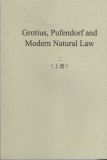用户登陆搜 索 |
查看图书
图书目录:Acknowledgements
Series Preface Introduction PART I HUGO GROTIUS i M.B. Crowe (1976), 'The "Impious Hypothesis": A Paradox in Hugo Grotius?' Tijdschrift voor Filosofie, 38, pp. 379-410. 2 Knud Haakonssen (1985), 'Hugo Grotius and the History of Political Thought', Political Theory, 13, pp. 239-65. 3 Robert Shaver (1996), 'Grotius on Scepticism and Self-Interest', Archivfiir Geschichte der Philosophie, 78, pp. 27-47. 4 Richard Tuck (1983), 'Grotius, Carneades and Hobbes', Grotiana, N.S., 4, pp. 43-62. PART II JOHN SELDEN 5 Michael Bertram Crowe (1977), 'An Eccentric Seventeenth-Century Witness to the Natural Law: John Selden (1584-1654)', Natural Law Forum, 12, pp. 184-95. 6 J.P. Sommerville (1984), 'John Selden, the Law of Nature, and the Origins of Government', The Historica! Journal , 27, pp. 437 --1,7. PART III SAMUEL VON PUFENDORF 7 Craig L. Carr and Michael J. Seidler (1996), 'Pufendorf, Sociality and the Modern State', History of Political Thought, 17, pp. 354-78. 8 Thomas Mautner (1989), 'Pufendorf and the Correlativity Theory of Rights', in Sten Lindstr6m and Wlodzimierz Rabinowicz (eds), In so Many Words: Philosophical Essays Dedicated to Sven Danielson on the Occasion of His Fiftieth Birthday, Philosophical Studies published by the Philosophical Society and the Department of Philosophy, University of Uppsala, no. 42, pp. 37-59. 9 Michael Nutkiewicz (1983), 'Samuel Pufendorf: Obligation as the Basis of the State', Journal of the History of Philosophy, 21, pp. 15-29. 10 J.B. Schneewind (1987), 'Pufendorf's Place in the History of Ethics', Synthese, 72, pp. 123-55. PART IV GOTTFRIED WILHELM VON LEIBNIZ r 11 Robert J. Mulvaney (1968), 'The Early Development of Leibniz's Concept of Justice', Journal of the History of Ideas, 29, pp. 53-72. 12 Robert J. Mulvaney (1975), 'Divine Justice in Leibniz's "Discourse on Metaphysics" ', Studia Leibnitiana, Supplement 14, pp. 61-82. PART V RICHARD CUMBERLAND 13 Murray Forsyth (1982), 'The Place of Richard Cumberland in the History of Natural Law Doctrine', Journal of the History of philosophy, 20, pp. 23-42. 14 J.B. Schneewind (1995), 'Voluntarism and the Origins of Utilitarianism', Util~tas, 7, pp. 87-96. PART VI CHRISTIAN THOMASIUS 15.F.MBarnard (1971),'The "Practical Philosophy "of Christian Thomasius', Journal of the History of Ideas, 32, pp. 221-46. 16 Frederick M. Barnard (1988), 'Fraternity and Citizenship: Two Ethics of Mutuality in Christian Thomasius', Review of Politics, 5fl, pp. 582--602. 17 Robert Spaethting (1971), 'On Christian Thomasius and his Alleged Offspring: The German Enlightenment', Lessing Yearbook, 3, pP. 194-213. PART VII JEAN BARBEYRAC 18 Tim Hochstrasser (1993), 'Conscience and Reason: The Natural Law Theory of Jean Barbeyrac', The Historical Journal, 36, pp. 289-308. PART VIII EMER DE VATTEL 19 Frederick G. Whelan (1988), 'Vattel's Doctrine ~t the State', History of Political Thought, 9, pp. 59-90. PART IX JEAN-JACQUES ROUSSEAU 20 Robert Wokler (1994), 'Rousseau's Pufendorf: Natural Law and the Foundations of Commercial Society', History of Political Thought, 15, pp. 373-402. PART X IMMANUEL KANT 21 J.B. Schneewind (1993), 'Kant and Natural Law Ethics', Ethics, 104, pp. 53-74. PART XI USES OF NATURAL LAW 22 Anthony Burns (1984), 'The Source of the Encyclopddie Article "Loi Naturelle (Morale)"', British Journal for Eighteenth-Century Studies, 7, pp. 39-48. 23 Diethelm Klippel (1994), 'Johann August Schlettwein and the Economic Faculty at the University of Giegen', History of Political Thought, 15, pp. 203-27. 24 Andrew S. Skinner (1995), 'Pufendorf, Hutcheson and Adam Smith: Some Principles of Political Economy', Scottish Journal of Political Economy, 42, pp. 1-29. 25 Ursula Vogel (1991), 'Political Philosophers and the Trouble with Polygamy: Patriarchal Reasoning in Modem Natural Law', History of Political Thought, 12, pp. 229-51. Name Index |

